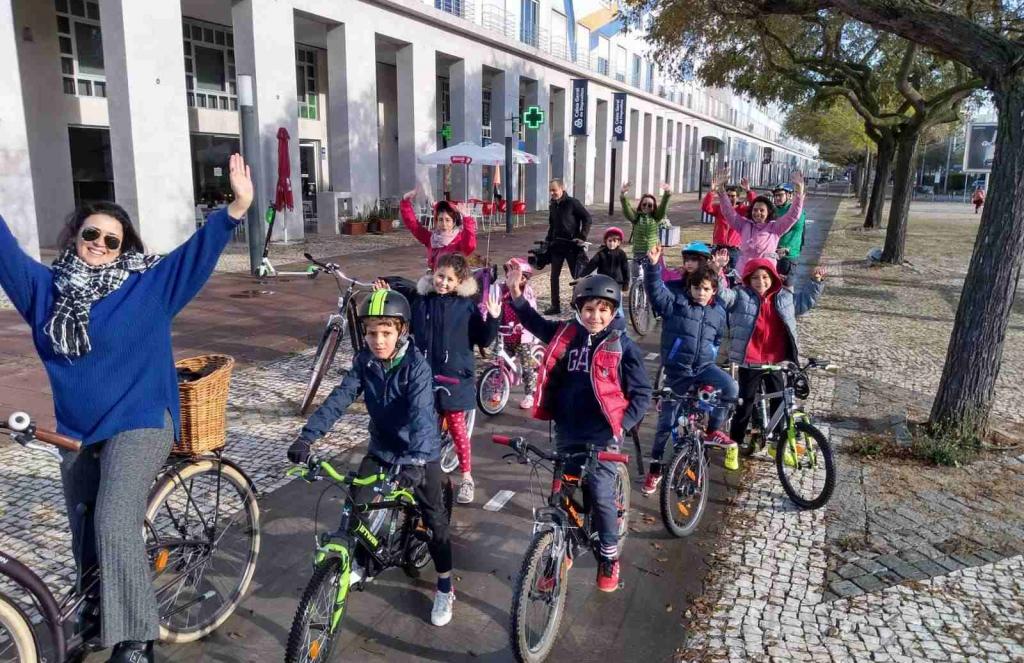Thessaloniki gets ready for its metro launch in November
The underground rapid transit lines have been under construction for almost two decades due to various project delays
 TheMayor.EU logo
TheMayor.EU logo 
Portuguese children on their way to school as part of a comboio de bicicleta, Source: Ciclo Expresso
The initiative has already taken root in Aveiro, Braga and Lisbon, and soon in Matosinhos
Ciclo Expresso is the name of an initiative, which combines the various comboios de bicicleta, or cycling trains in Portugal. These “trains” do not run on railways and are instead composed of groups of children riding their bikes, led by an adult, on their way to school.
The train part in the term comes from the association that just like the public transit vehicles, these cycling trains have a predetermined route and a destination, as well as scheduled stops where children can join. If it sounds familiar that might be so because the concept has also been introduced in the city of Barcelona, however, there it is known as a cycling bus (bicibús).
In Portugal, the concept originated in 2015 when a father in Lisbon decided to take his 5-year-old son to school by riding bikes together. He, however, also had the wish to see more children participating in that activity and sought institutional support from his local Parish Council and a parents’ association to make it a reality.
The mission of the initiative is to promote sustainable urban mobility among the youngest generation through a safe and sociable experience. Riding a bike to school also contributes to developing a child’s autonomy and healthy habits.
Today, cycling trains to school are available in Lisbon, Aveiro, Braga, where they also enjoy support from the local city councils. Lisbon alone has 17 participating schools in the initiative and 28 defined routes.
Participation in the cycling trains is free of charge for children and parents. All that is needed is a personal bicycle and a helmet.
The route is designed in order to pass close to each child’s residence, defining stopping places where passengers can “enter” the train. Thus, the route may not be the most direct between home and school, but it will allow children to start the day with a fun, healthy and group trip.
The project team also assesses the level of safety and comfort of the available road and cycling network, optimizing the defined routes based on this information.

The underground rapid transit lines have been under construction for almost two decades due to various project delays

Now you can get your wine in Talence by paying directly in Bitcoin

That’s because the state has to spend money on updating the railway infrastructure rather than subsidizing the cost of the popular pass

Rethinking renewable energy sources for the urban landscape

The examples, compiled by Beyond Fossil Fuels, can inform and inspire communities and entrepreneurs that still feel trepidation at the prospect of energy transition

Now you can get your wine in Talence by paying directly in Bitcoin

The 10th European Conference on Sustainable Cities and Towns (ESCT) sets the stage for stronger cooperation between the EU, national and local level to fast track Europe's transition to climate neutrality.

At least, that’s the promise made by the mayor of Paris, Anne Hidalgo

The underground rapid transit lines have been under construction for almost two decades due to various project delays

At least, that’s the promise made by the mayor of Paris, Anne Hidalgo

Hostal de Pinós is located in the geographical centre of the autonomous region

Despite its church-y name, the district has long been known as the hangout spot for the artsy crowds

Urban dwellers across the EU are having a say in making their surroundings friendlier to people and the environment.

Forests in the EU can help green the European construction industry and bolster a continent-wide push for architectural improvements.

Apply by 10 November and do your part for the transformation of European public spaces

An interview with the Mayor of a Polish city that seeks to reinvent itself

An interview with the newly elected ICLEI President and Mayor of Malmö

A conversation with the Mayor of Lisbon about the spirit and dimensions of innovation present in the Portuguese capital














